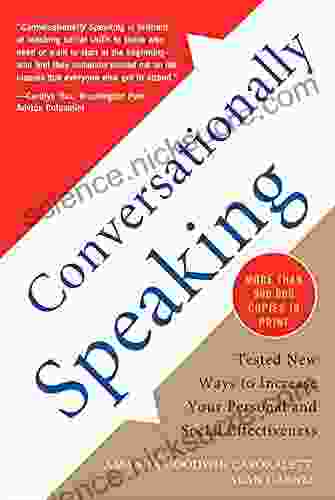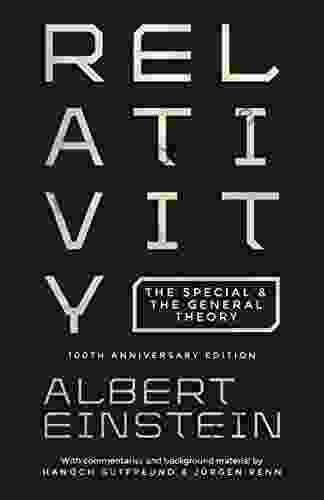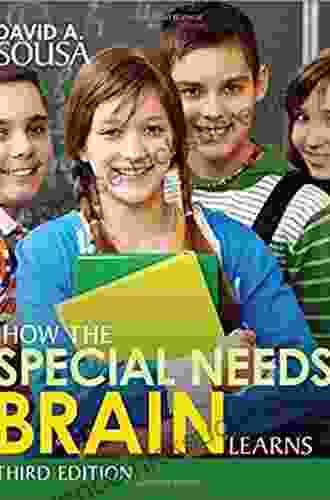How the Special Needs Brain Learns: Unlocking a World of Educational Possibilities

4.6 out of 5
| Language | : | English |
| File size | : | 3891 KB |
| Text-to-Speech | : | Enabled |
| Screen Reader | : | Supported |
| Enhanced typesetting | : | Enabled |
| Word Wise | : | Enabled |
| Print length | : | 293 pages |
Understanding the Special Needs Brain
The special needs brain refers to the neurological makeup of individuals with a variety of learning, cognitive, and developmental differences. These differences can manifest in a wide range of abilities and challenges, affecting how individuals process, understand, and respond to information.
It's crucial to approach education for individuals with special needs from a strength-based perspective, focusing on their unique abilities and perspectives rather than their deficits. Understanding the underlying cognitive and neurological mechanisms can empower educators and caregivers with effective strategies to support their learning journeys.
Learning Styles of the Special Needs Brain
Individuals with special needs exhibit diverse learning styles that differ from traditional educational norms. Understanding these unique styles is fundamental to creating inclusive and effective learning environments.
- Visual Learners: These individuals learn best through visual cues, such as pictures, diagrams, and videos.
- Auditory Learners: They prefer auditory input, such as spoken words, music, and audiobooks.
- Kinesthetic Learners: They learn through hands-on experiences, movement, and physical engagement.
- Multisensory Learners: They combine multiple sensory channels to facilitate learning, involving sight, sound, touch, smell, and taste.
- Social Learners: They thrive in collaborative environments, engaging with peers and instructors to enhance their understanding.
Effective Teaching Strategies for the Special Needs Brain
Empowering educators with effective teaching strategies is essential for unlocking the potential of the special needs brain. These strategies should be tailored to the individual's unique learning style, strengths, and areas of challenge.
- Multimodal Learning: Incorporating different sensory channels, such as visual aids, hands-on activities, and auditory cues.
- Explicit Instruction: Breaking down concepts into smaller, manageable steps with clear and direct explanations.
- Repetition and Reinforcement: Providing multiple opportunities for practice and feedback to enhance retention.
- Differentiated Learning: Customizing learning materials and activities to meet the individual's specific needs and learning pace.
- Assistive Technology: Utilizing assistive devices and software to support learning, such as text-to-speech tools, screen magnifiers, and adaptive keyboards.
Tailored Support Systems for the Special Needs Brain
Beyond instructional strategies, tailored support systems are crucial for fostering academic and personal growth in individuals with special needs.
- Individualized Education Plans (IEPs): These plans document a student's unique educational goals, accommodations, and support services.
- Special Education Services: Specialized instruction and support provided by trained educators in areas such as speech therapy, occupational therapy, and physical therapy.
- Assistive Technology Support: Ensuring access to appropriate assistive technology and training for both students and educators.
- Social and Emotional Support: Creating a supportive and inclusive learning environment that addresses social-emotional needs and promotes positive self-esteem.
- Parent and Family Involvement: Regular communication and collaboration between educators and parents to foster a shared understanding and support system.
Cognitive Adaptations for the Special Needs Brain
Individuals with special needs may require specific cognitive adaptations to maximize their learning potential. These adaptations focus on addressing cognitive challenges and enhancing executive functioning skills.
- Visual Aids: Using charts, diagrams, and graphic organizers to support comprehension and memory.
- Sensory Supports: Utilizing fidget tools, noise-canceling headphones, and tactile aids to regulate sensory processing and improve focus.
- Time Management Techniques: Implementing visual schedules, timers, and task-breaking strategies to enhance time awareness and planning skills.
- Memory Enhancement Techniques: Employing mnemonic devices, repetition, and retrieval cues to improve memory and recall abilities.
- Cognitive Training Programs: Engaging in specific cognitive training exercises designed to enhance attention, working memory, and problem-solving skills.
Sensory Processing Differences in the Special Needs Brain
Sensory processing differences are common among individuals with special needs, impacting how they perceive and respond to sensory stimuli from the environment.
Understanding and addressing these differences is crucial for creating sensory-friendly learning environments that minimize distractions and support optimal learning.
- Visual Processing Differences: Sensitivity to bright lights, difficulty distinguishing colors, or visual distortions.
- Auditory Processing Differences: Hypersensitivity to noise, difficulty filtering out background sounds, or auditory distortions.
- Tactile Processing Differences: Over- or under-sensitivity to touch, textures, or temperature.
- Sensory Integration Challenges: Difficulty processing sensory information from multiple channels, leading to sensory overload or under-stimulation.
- Sensory Accommodation Strategies: Implementing sensory supports such as weighted blankets, noise-canceling headphones, or calming scents to regulate sensory processing.
Emotional Regulation in the Special Needs Brain
Individuals with special needs may exhibit unique emotional regulation patterns. They may experience challenges in identifying, understanding, and managing their emotions.
Emotional regulation skills are essential for academic and social-emotional success. Supporting individuals with special needs in developing these skills empowers them to cope with challenges and thrive in various settings.
- Social-Emotional Learning Programs: Incorporating programs that teach emotional identification, regulation, and coping mechanisms.
- Mindfulness Techniques: Practicing mindfulness exercises, such as deep breathing and body scans, to enhance self-awareness and emotional control.
- Positive Behavior Interventions and Supports (PBIS): Establishing consistent strategies for managing challenging behaviors and promoting positive social interactions.
- Trauma-Informed Care: Creating a supportive and understanding environment that recognizes and addresses potential trauma histories.
- Collaboration with Mental Health Professionals: Consulting with mental health professionals for specialized support and interventions.
Social Communication Differences in the Special Needs Brain
Individuals with special needs may experience social communication differences, affecting how they interact, communicate, and build relationships.
Supporting social communication development enhances their ability to engage in meaningful social interactions, express themselves effectively, and participate fully in their communities.
- Social Skills Training Programs: Providing structured opportunities to learn and practice social skills, such as conversation techniques, peer interaction, and conflict resolution.
- Communication Supports: Utilizing alternative communication methods, such as sign language, picture boards, or augmentative and alternative communication (AAC) devices.
- Peer Support Groups: Facilitating peer support groups where individuals can connect, share experiences, and learn from each other.
- Social Narratives: Creating social stories that describe specific social situations and provide guidance on appropriate behaviors.
- Role-Playing Activities: Practicing social interactions through role-playing and simulations to build confidence and enhance social communication skills.
Executive Functioning Challenges in the Special Needs Brain
Executive functions are higher-level cognitive processes that control and manage other cognitive abilities. Individuals with special needs may encounter challenges in these areas, affecting their ability to plan, organize, and manage their time, behavior, and emotions.
Supporting executive functioning skills is crucial for academic success and everyday life. Strategies include:
- Visual Supports: Using visual schedules, checklists, and reminders to improve planning, organization, and time management.
- Time Management Strategies: Teaching time estimation techniques, breaking down large tasks into smaller steps, and providing visual cues for transitions.
4.6 out of 5
| Language | : | English |
| File size | : | 3891 KB |
| Text-to-Speech | : | Enabled |
| Screen Reader | : | Supported |
| Enhanced typesetting | : | Enabled |
| Word Wise | : | Enabled |
| Print length | : | 293 pages |
Do you want to contribute by writing guest posts on this blog?
Please contact us and send us a resume of previous articles that you have written.
 Fiction
Fiction Non Fiction
Non Fiction Romance
Romance Mystery
Mystery Thriller
Thriller SciFi
SciFi Fantasy
Fantasy Horror
Horror Biography
Biography Selfhelp
Selfhelp Business
Business History
History Classics
Classics Poetry
Poetry Childrens
Childrens Young Adult
Young Adult Educational
Educational Cooking
Cooking Travel
Travel Lifestyle
Lifestyle Spirituality
Spirituality Health
Health Fitness
Fitness Technology
Technology Science
Science Arts
Arts Crafts
Crafts DIY
DIY Gardening
Gardening Petcare
Petcare Tonya Johnston
Tonya Johnston Jane P Gardner
Jane P Gardner E A Koetting
E A Koetting Peter Irvine
Peter Irvine Alice Scordato
Alice Scordato Stephanie Izard
Stephanie Izard Rene D Zweig
Rene D Zweig Jan Smith
Jan Smith Dean Burnett
Dean Burnett Ahmed Osman
Ahmed Osman Steven H Strogatz
Steven H Strogatz Constance Classen
Constance Classen Letisha Galloway
Letisha Galloway W E Fairbairn
W E Fairbairn John Riley
John Riley Nick Hughes
Nick Hughes S A Klopfenstein
S A Klopfenstein S Connolly
S Connolly Steve Moore
Steve Moore Franz Metcalf
Franz Metcalf Zondervan
Zondervan United States Government Us Marine Corps
United States Government Us Marine Corps Craig Childs
Craig Childs Florence Williams
Florence Williams Matthew Sturm
Matthew Sturm Vernon Coleman
Vernon Coleman Alan Murchison
Alan Murchison Akwaeke Emezi
Akwaeke Emezi Jerry Robeson
Jerry Robeson Alan R Hall
Alan R Hall William Foote Whyte
William Foote Whyte Eden O Neill
Eden O Neill Bradley Efron
Bradley Efron Snap Summaries
Snap Summaries Lisa Kenney
Lisa Kenney Alan Booth
Alan Booth Arnold Yates
Arnold Yates Brandy Roon
Brandy Roon Lo Bosworth
Lo Bosworth Spencer Wells
Spencer Wells Michal Stawicki
Michal Stawicki Arthur Fleischmann
Arthur Fleischmann Terry L Duran
Terry L Duran Michael Shermer
Michael Shermer Martin Rooney
Martin Rooney Sonia Nazario
Sonia Nazario Mark Occhilupo
Mark Occhilupo Hervey Garrett Smith
Hervey Garrett Smith Alana Mclaren
Alana Mclaren David Jason
David Jason Mark Harris
Mark Harris Alan Shipnuck
Alan Shipnuck Robert Heidler
Robert Heidler Po Bronson
Po Bronson Jessica Cunsolo
Jessica Cunsolo Jeremy Miles
Jeremy Miles Grace Lebow
Grace Lebow Markus Rex
Markus Rex Orson Scott Card
Orson Scott Card Al Roker
Al Roker Joanne Webb
Joanne Webb Bob Plott
Bob Plott Matthew Mcbee
Matthew Mcbee Marcus Chown
Marcus Chown Zita West
Zita West Judith Garrard
Judith Garrard Cindy Hudson
Cindy Hudson Sarah Hendrickx
Sarah Hendrickx Skeleton Steve
Skeleton Steve Carol Tuttle
Carol Tuttle Alan Rouse
Alan Rouse Courtney Macavinta
Courtney Macavinta Noel St Clair
Noel St Clair Gordon H Orians
Gordon H Orians George Monbiot
George Monbiot Helen Palmer
Helen Palmer Joyce Burkhalter Flueckiger
Joyce Burkhalter Flueckiger Robin Mckinley
Robin Mckinley Contractor Education Inc
Contractor Education Inc I Johnson
I Johnson Jeff Maynard
Jeff Maynard Aimee Aristotelous
Aimee Aristotelous Meredith Marsh
Meredith Marsh Charles B White
Charles B White Hannah Ewens
Hannah Ewens J Zoltan
J Zoltan Amanda Ford
Amanda Ford Amelia Mayer
Amelia Mayer Amye Archer
Amye Archer Kim Stanley Robinson
Kim Stanley Robinson G E R Lloyd
G E R Lloyd Nick Lyons
Nick Lyons Molly Absolon
Molly Absolon Hope Smith
Hope Smith Helen Hollick
Helen Hollick Tenth Edition Revised Kindle Edition
Tenth Edition Revised Kindle Edition Jon Emmett
Jon Emmett Rick Bass
Rick Bass Magnus Thollander
Magnus Thollander Mariam N Ottimofiore
Mariam N Ottimofiore Sheila Barton
Sheila Barton Joe Berardi
Joe Berardi Alan E Sparks
Alan E Sparks Rebekah Sack
Rebekah Sack Al Owens
Al Owens Jacqueline Church Simonds
Jacqueline Church Simonds Truman Everts
Truman Everts Kevin Williams
Kevin Williams Celeste Headlee
Celeste Headlee Aitzaz Imtiaz
Aitzaz Imtiaz Louis Schubert
Louis Schubert Vera Nazarian
Vera Nazarian Catherine Belknap
Catherine Belknap Kiku Hughes
Kiku Hughes Michael Gray
Michael Gray Billy Walsh
Billy Walsh Edupan7 Publishing
Edupan7 Publishing John Muir
John Muir John H Moore
John H Moore Daniel C Okpara
Daniel C Okpara Michael Morpurgo
Michael Morpurgo Samuel Carbaugh
Samuel Carbaugh Bill Parisi
Bill Parisi Kerstin Gier
Kerstin Gier Chris Klug
Chris Klug Lecile Harris
Lecile Harris R A Salvatore
R A Salvatore Alan C Acock
Alan C Acock Katharine Graves
Katharine Graves Jacob K Olupona
Jacob K Olupona Linda Welters
Linda Welters Mike Rothschild
Mike Rothschild Gregory J Davenport
Gregory J Davenport Margit Ystanes
Margit Ystanes Jerry Robertson
Jerry Robertson James Gleick
James Gleick Matt Mosher
Matt Mosher Richard Pears
Richard Pears James A Michener
James A Michener Nancy Hughes
Nancy Hughes Alex Light
Alex Light James F Boswell
James F Boswell Ged Jenkins Omar
Ged Jenkins Omar Bobby Flay
Bobby Flay Beata Bliss Lewis Md
Beata Bliss Lewis Md Alan Lightman
Alan Lightman Frances E Jensen
Frances E Jensen Janice Selekman
Janice Selekman Patrick O Sullivan
Patrick O Sullivan Vishwesh Bhatt
Vishwesh Bhatt Gill Rapley
Gill Rapley Lingo Mastery
Lingo Mastery Princess Her
Princess Her Alan Gelb
Alan Gelb Clint Emerson
Clint Emerson Emeran Mayer
Emeran Mayer Aileen Erin
Aileen Erin Gavin Francis
Gavin Francis Aidan Chambers
Aidan Chambers Jacqueline Tourville
Jacqueline Tourville Theodore P Jorgensen
Theodore P Jorgensen Alana Chernila
Alana Chernila Harold Klemp
Harold Klemp Helena Clare
Helena Clare Jim Steenburgh
Jim Steenburgh Bettina Gordon Wayne
Bettina Gordon Wayne Harriet Brown
Harriet Brown John Bird
John Bird Peter Ballingall
Peter Ballingall Thomas Kurz
Thomas Kurz Dr Joseph Parent
Dr Joseph Parent Chris Vines
Chris Vines Samuel N Rosenberg
Samuel N Rosenberg Mel Thompson
Mel Thompson Rose Lynn Fisher
Rose Lynn Fisher Gary Smith
Gary Smith Carl Gustav Jung
Carl Gustav Jung Anthonissa Moger
Anthonissa Moger Marc M Triola
Marc M Triola Juliet Marillier
Juliet Marillier Anahad O Connor
Anahad O Connor Dave Whitson
Dave Whitson Clyde Fitch
Clyde Fitch Dylan Alcott
Dylan Alcott Jay Speight
Jay Speight Gillian Gill
Gillian Gill Dmitry Zinoviev
Dmitry Zinoviev Jay Annelli
Jay Annelli Esther Parry
Esther Parry Al Macy
Al Macy Donna Morang
Donna Morang Alan Margot
Alan Margot Christopher Scordo
Christopher Scordo Douglas T Hall
Douglas T Hall Aja Raden
Aja Raden Bill Walker
Bill Walker Alan Graham
Alan Graham Alan Burdick
Alan Burdick Jane Bottomley
Jane Bottomley Jakob Tanner
Jakob Tanner Lex Croucher
Lex Croucher Andrew Jamieson
Andrew Jamieson Bruce Lee
Bruce Lee Morgan Lyle
Morgan Lyle Mendocino Press
Mendocino Press Peg Tyre
Peg Tyre George E Andrews
George E Andrews Madeline Milne
Madeline Milne Sir Edmund Hillary
Sir Edmund Hillary Leif K Karlsen
Leif K Karlsen Nilakantasrinivasan J Neil
Nilakantasrinivasan J Neil Kerry Diamond
Kerry Diamond Susan B Lovejoy
Susan B Lovejoy Kristine Barnett
Kristine Barnett Al Sweigart
Al Sweigart Shoshana Levin Fox
Shoshana Levin Fox Chris Bowers
Chris Bowers Scott Surovich
Scott Surovich Takuan Soho
Takuan Soho Judy Jewell
Judy Jewell Alan S Gurman
Alan S Gurman M K Hume
M K Hume Akil Palanisamy
Akil Palanisamy Robert E Stake
Robert E Stake Brenda Nathan
Brenda Nathan Layla Moon
Layla Moon Anne Enright
Anne Enright James Willard Schultz
James Willard Schultz Jessica Cornwell
Jessica Cornwell Anne Dachel
Anne Dachel Nassim Nicholas Taleb
Nassim Nicholas Taleb Hammad Fozi
Hammad Fozi Gina Guddat
Gina Guddat Caitlin Zaloom
Caitlin Zaloom Christopher Gavigan
Christopher Gavigan Aiva Books
Aiva Books Doug Gelbert
Doug Gelbert Isabella Morris
Isabella Morris Natazha Raine O Connor
Natazha Raine O Connor Kate Brian
Kate Brian Albert Einstein
Albert Einstein Belinda Luscombe
Belinda Luscombe Brian Mills
Brian Mills Daphne Rose Kingma
Daphne Rose Kingma Jamie Baulch
Jamie Baulch Kevin Hunter
Kevin Hunter Jackson Katz
Jackson Katz Olivia Gentile
Olivia Gentile Tod E Bolsinger
Tod E Bolsinger Sophia Joy
Sophia Joy Alan Hearnshaw
Alan Hearnshaw Sam J Fires
Sam J Fires Martin Erwig
Martin Erwig Eddy Starr Ancinas
Eddy Starr Ancinas Douglas Noll
Douglas Noll Timm Woods
Timm Woods Hiro Ainana
Hiro Ainana Terry Breverton
Terry Breverton Michael W King
Michael W King Howard Hill
Howard Hill Rob Casey
Rob Casey William Harding
William Harding Celeste Jones
Celeste Jones Michael Freedland
Michael Freedland Alan S Kaufman
Alan S Kaufman Barbara Scott
Barbara Scott Rebecca Jones
Rebecca Jones Gail Tully
Gail Tully David Roberts
David Roberts Vasilis Konstantinos Giontzis
Vasilis Konstantinos Giontzis Alice Oseman
Alice Oseman Kardas Publishing
Kardas Publishing 12th Edition Kindle Edition
12th Edition Kindle Edition Angelina Wilson
Angelina Wilson Sara Hanover
Sara Hanover Andre Agassi
Andre Agassi Gayle Peterson
Gayle Peterson Kareem Abdul Jabbar
Kareem Abdul Jabbar John Feinstein
John Feinstein Erin Lovelace
Erin Lovelace Leigh Sales
Leigh Sales John Leo
John Leo Kidada Jones
Kidada Jones George Knudson
George Knudson Andrew Rowe
Andrew Rowe Kate Bettison
Kate Bettison Aidan Comerford
Aidan Comerford Roxy And Ben Dawson
Roxy And Ben Dawson David D Burns
David D Burns Jack Nicklaus
Jack Nicklaus Dorothy H Crawford
Dorothy H Crawford John Irving
John Irving James Witts
James Witts G H Hardy
G H Hardy Kelly Jensen
Kelly Jensen Charlotte Markey
Charlotte Markey Al Marlowe
Al Marlowe Alan Porter
Alan Porter Juno Roche
Juno Roche Megan Gray Md
Megan Gray Md Conor Daly
Conor Daly Stephen Wolfram
Stephen Wolfram Martin J Pring
Martin J Pring Ann Hagedorn
Ann Hagedorn Micky Ward
Micky Ward Robert Macfarlane
Robert Macfarlane Dusty Rhodes
Dusty Rhodes William A Kaplin
William A Kaplin Howard Maxwell
Howard Maxwell Satya Sundar Sethy
Satya Sundar Sethy Laurie Pickard
Laurie Pickard Amelia Simmons
Amelia Simmons Francesca Lia Block
Francesca Lia Block Marsha Wenig
Marsha Wenig Dimitri Loose
Dimitri Loose Steven Horak
Steven Horak Don Casey
Don Casey Al Strachan
Al Strachan Miles Mckenna
Miles Mckenna Ainsley Arment
Ainsley Arment Jon Tyson
Jon Tyson Stephen M Camarata
Stephen M Camarata Margaret J Wheatley
Margaret J Wheatley Donald Woods Winnicott
Donald Woods Winnicott John J Miller
John J Miller Mike Warren
Mike Warren Ken Denmead
Ken Denmead Aileen Nielsen
Aileen Nielsen Nicholas Romanov
Nicholas Romanov Vanessa Ogle
Vanessa Ogle Jessica Battilana
Jessica Battilana Michael Miller
Michael Miller Frank E Harrell Jr
Frank E Harrell Jr Erin Ekins
Erin Ekins Wayne Stewart
Wayne Stewart Edward A Tiryakian
Edward A Tiryakian Lauren Blackwood
Lauren Blackwood Deitra Leonard Lowdermilk
Deitra Leonard Lowdermilk Collins Easy Learning
Collins Easy Learning Habeeb Quadri
Habeeb Quadri Saul Rip
Saul Rip Rosemarie Anderson
Rosemarie Anderson Nina Lacour
Nina Lacour Bryan Mann
Bryan Mann Alaina Talboy
Alaina Talboy Lee Carroll
Lee Carroll Paul G Schempp
Paul G Schempp Pallas Snider
Pallas Snider Ndeye Labadens
Ndeye Labadens Martin Luther King Jr
Martin Luther King Jr Anna Hickey Moody
Anna Hickey Moody Howard Greene
Howard Greene Graham Bower
Graham Bower Bill Friedrich
Bill Friedrich John T Hansen
John T Hansen Michael D Rich
Michael D Rich Robert M Emerson
Robert M Emerson Jonathan Gottschall
Jonathan Gottschall Andy Zipser
Andy Zipser David A Sousa
David A Sousa Ron L Deal
Ron L Deal Gary Player
Gary Player Noha Mellor
Noha Mellor Dan Dipiro
Dan Dipiro Kiersten White
Kiersten White George Buehler
George Buehler Michael Sidgwick
Michael Sidgwick Timothy C Smith
Timothy C Smith Teresa Mccallum
Teresa Mccallum Mary Basick
Mary Basick Toby Wilkinson
Toby Wilkinson Elizabeth Thompson
Elizabeth Thompson Paramahansa Yogananda
Paramahansa Yogananda We Fairbairn
We Fairbairn Alastair Humphreys
Alastair Humphreys Ken Schultz
Ken Schultz Suze Guillaume
Suze Guillaume Deborah Harkness
Deborah Harkness Al Barkow
Al Barkow Tim Gallagher
Tim Gallagher Steven Trimble
Steven Trimble Thomas Metzinger
Thomas Metzinger Tina Dreffin
Tina Dreffin Farlex International
Farlex International Massad Ayoob
Massad Ayoob Jill Homer
Jill Homer Mark Drolsbaugh
Mark Drolsbaugh Will Storr
Will Storr Melinda Rushe
Melinda Rushe Josh Kilmer Purcell
Josh Kilmer Purcell Aphra Behn
Aphra Behn Gary R Varner
Gary R Varner Joe Clement
Joe Clement George M Fredrickson
George M Fredrickson Taquetta Baker
Taquetta Baker Dr Guy Leschziner
Dr Guy Leschziner Gary B Ferngren
Gary B Ferngren Joe Bertagna
Joe Bertagna Lexie Scott
Lexie Scott Rehana Jawadwala
Rehana Jawadwala The Rogue Hypnotist
The Rogue Hypnotist Bryon Powell
Bryon Powell Amy Edelstein
Amy Edelstein Lisa Marasco
Lisa Marasco Andy Adams
Andy Adams Peter Hathaway Capstick
Peter Hathaway Capstick Penney Peirce
Penney Peirce Cat Warren
Cat Warren Rand Cardwell
Rand Cardwell Steve Michalik
Steve Michalik Janet Houser
Janet Houser Aidan Dodson
Aidan Dodson Christopher Hellman
Christopher Hellman Len Sperry
Len Sperry Mackenzi Lee
Mackenzi Lee Alan Vermilye
Alan Vermilye Robert A Sadowski
Robert A Sadowski Al Yellon
Al Yellon Sara Wickham
Sara Wickham Terry Funk
Terry Funk Antipodean Writer
Antipodean Writer Mark Booth
Mark Booth Tom Shachtman
Tom Shachtman Charles J Thayer
Charles J Thayer Jordon Greene
Jordon Greene Yang Jwing Ming
Yang Jwing Ming Cynthia Clumeck Muchnick
Cynthia Clumeck Muchnick Publishdrive Edition Kindle Edition
Publishdrive Edition Kindle Edition Gordon R Dickson
Gordon R Dickson Lisa Newton
Lisa Newton Original Edition Kindle Edition
Original Edition Kindle Edition Ai Publishing
Ai Publishing Shaun Tomson
Shaun Tomson Aileen Evans
Aileen Evans Percy Boomer
Percy Boomer Mark Goulston
Mark Goulston Trevor Lund
Trevor Lund Michael Domican
Michael Domican Carla Schroder
Carla Schroder Denise Alvarado
Denise Alvarado Damon Lee
Damon Lee Alfred S Posamentier
Alfred S Posamentier Kai Nacke
Kai Nacke George Plimpton
George Plimpton Barbara Oehlberg
Barbara Oehlberg Bob Mayer
Bob Mayer Kevin B Shearer
Kevin B Shearer Christos A Djonis
Christos A Djonis Dave Heller
Dave Heller Dennis Jarecke
Dennis Jarecke Andrew Blum
Andrew Blum Larry Wasserman
Larry Wasserman David Vine
David Vine Al Ristori
Al Ristori Jeanne Faulkner
Jeanne Faulkner Betsy Tobin
Betsy Tobin Jane Poynter
Jane Poynter Michael Casey
Michael Casey Al Desetta M A
Al Desetta M A Mike Martin
Mike Martin Pavel Tsatsouline
Pavel Tsatsouline J R Haseloff
J R Haseloff Pantea Kalhor
Pantea Kalhor Shing Tung Yau
Shing Tung Yau Jay Revell
Jay Revell Elaine Howard Ecklund
Elaine Howard Ecklund Ilan Dvir
Ilan Dvir Bruce J Macfadden
Bruce J Macfadden Emily Harris Adams
Emily Harris Adams David Crabtree
David Crabtree Jonathan White
Jonathan White Mista Nove
Mista Nove Bianca Smith
Bianca Smith E Cheng
E Cheng Sandy Lindsey
Sandy Lindsey Andrea Travillian
Andrea Travillian David King
David King Benjamin Johnston
Benjamin Johnston Douglas G Altman
Douglas G Altman Jay H Lefkowitch
Jay H Lefkowitch Linda G Morris
Linda G Morris Melissa Bashardoust
Melissa Bashardoust Karen Levin Coburn
Karen Levin Coburn Christopher Willard
Christopher Willard Anders Halverson
Anders Halverson Robert L Kelly
Robert L Kelly Arnold Haultain
Arnold Haultain Jacqueline Fitzpatrick
Jacqueline Fitzpatrick Jenni Hicks
Jenni Hicks Mykel Hawke
Mykel Hawke Al Pasha
Al Pasha Alan Watts
Alan Watts David F Kelly
David F Kelly Dawn Sakamoto Paiva
Dawn Sakamoto Paiva Roy Dittmann
Roy Dittmann Alan Garner
Alan Garner Thubten Chodron
Thubten Chodron Erica Westly
Erica Westly Julie Bradley
Julie Bradley Alan Lawrence Sitomer
Alan Lawrence Sitomer Dr David Geier
Dr David Geier Alan E Kazdin
Alan E Kazdin Lj Andrews
Lj Andrews Jill Stamm
Jill Stamm
Light bulbAdvertise smarter! Our strategic ad space ensures maximum exposure. Reserve your spot today!

 Henry JamesTested New Ways to Increase Your Personal and Social Effectiveness (Updated...
Henry JamesTested New Ways to Increase Your Personal and Social Effectiveness (Updated... Jamie BlairFollow ·14.8k
Jamie BlairFollow ·14.8k Randy HayesFollow ·18.6k
Randy HayesFollow ·18.6k Hayden MitchellFollow ·16.5k
Hayden MitchellFollow ·16.5k Jonathan HayesFollow ·11.3k
Jonathan HayesFollow ·11.3k Yasunari KawabataFollow ·15k
Yasunari KawabataFollow ·15k Desmond FosterFollow ·12.1k
Desmond FosterFollow ·12.1k Tyrone PowellFollow ·5.5k
Tyrone PowellFollow ·5.5k Hector BlairFollow ·15k
Hector BlairFollow ·15k

 Deacon Bell
Deacon BellCompilation of Short Stories on Mental Illness and Ways...
Mental illness is a serious issue that affects...

 Jonathan Hayes
Jonathan HayesThe Practical Guide to Raising Courageous and...
As parents, we all want...

 Carlos Fuentes
Carlos FuentesA Journey to Remember: The High Sierra Love Story of...
Prologue: A Wilderness Encounter Beneath...

 Douglas Foster
Douglas FosterEndless Conquest: Embark on an Immersive Dungeon Crawl in...
Endless Conquest is a captivating LitRPG...

 Caleb Long
Caleb LongThe Special and the General Theory 100th Anniversary...
The year 2015 marks a...
4.6 out of 5
| Language | : | English |
| File size | : | 3891 KB |
| Text-to-Speech | : | Enabled |
| Screen Reader | : | Supported |
| Enhanced typesetting | : | Enabled |
| Word Wise | : | Enabled |
| Print length | : | 293 pages |












